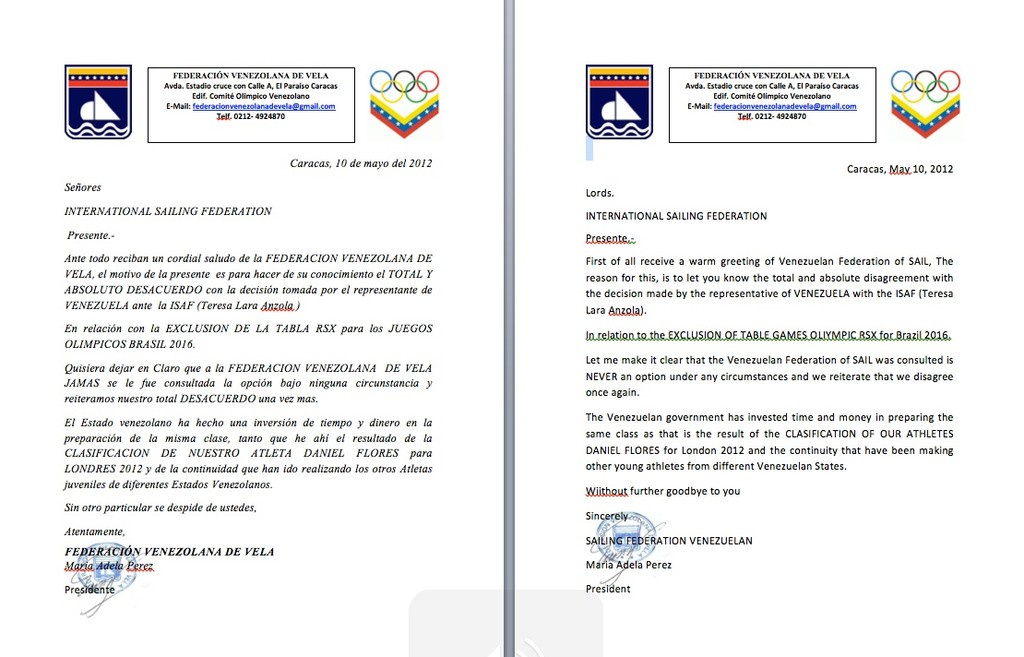2016 Olympics- Venezuela splits in ISAF Windsurfing vote debacle
by Richard Gladwell on 14 May 2012

The letter in English and Spanish released by the Venezuelan Sailing Federation SW
The Venezuelan national sailing authority is the latest to dissociate itself with the vote of one of its nationals at the recent ISAF Council Meeting staged in Stresa, Italy.
In a letter released today, they have expressed their disagreement with the vote of Venezuelan resident, Teresa Lara, one of seven Vice Presidents of the International Sailing Federation.
She was one of five of Vice Presidents, who are not believed to be subject to riding instructions, from their national authority, voted to have the Windsurfer removed from the slate for the 2016 Olympics in Rio de Janeiro.
There are a total of 42 representatives on the ISAF Council including non-voting members. They represent 17 regions around the world. Each region has either a single vote, or multiple votes depending on the number of countries represented. A checking of the voting list reveals that many of the regular Councillors were not present/did not personally vote and were represented by substitutes.
Venezuela is part of Area O, covering seven countries and with two votes. It is represented by Jane Moon (Cayman Islands) and Andres Santana (Dominican Republic). Moon voted for the Kiteboard option, Santana was represented by a substitute.
The translated statement reads:
First of all receive a warm greeting of Venezuelan Federation of SAIL, The reason for this, is to let you know the total and absolute disagreement with the decision made by the representative of Venezuela within ISAF (V.P. Teresa Lara Anzola).
In relation to the exclusion of the RS:X from the the Olympic Games in Brazil in 2016.
Let me make it clear that the Venezuelan Federation of SAIL was consulted, this decision was NEVER an option under any circumstances and we reiterate that we disagree once again.
The Venezuelan government has invested time and money in preparing the same class as that is the result of the selection of our athlete Daniel Flores for London 2012 and the continuity that have been making other young athletes from different Venezuelan States.
Two other countries, Spain and Israel have made statements apologizing to their windsurfing sailors and sailing membership for voting against windsurfing at a vote held in the Mid Year Meeting of the International Sailing Federation.
In another development, the manufacturer of the RS:X boardsailer dropped from the 2016 Olympics has lashed out in the fall-out from the ISAF Decisions. Former Olympian and millionaire businessman Neil Pryde has warned sailing is in danger of being kicked out of the Olympics as the fallout continues from the controversial decision to dump windsurfing in favour of kiteboarding for the 2016 Games.
Pryde, a New Zealander, who heads up a billion dollar a year business, which also produces kiteboards and the kites and associated gear.
Pryde told Reuters: 'Originally the idea was for sailing to ask for another medal at the Olympics by introducing kiteboarding.
'There was no talk of replacing windsurfing, but somehow, over the years, things have evolved and with the number of athletes at the Olympics being restricted, this has unfortunately occurred.
'While kiteboarding is a great sport, it is quite immature. There is no structure, no organisation and no youth development.
'And the plan was to introduce kiteboarding by the 2020 Games, not in 2016. Fast-forwarding a still developing sport is totally ridiculous.'
There has been no reaction from the International Sailing Federation.
The heart of the Venezuelan outburst is similar to that of many larger countries with partial government and trust funding of their sport. Those countries make a substantial investment in the development of future sailors and the decision to drop the windsurfer at best causes a major rejigging of those programs, and at worst writes off the investment to date.
The ISAF normally operates in a more considered fashion, and a move to drop one discipline and substitute another with no warning, and with delegates on a 'free' or un-briefed vote is very unusual. Additionally most voting is on the basis of adopting or declining a submission from a member country or and ISAF Committee. Again so that member countries have a 'heads-up' on what is on the agenda for a particular meeting and can brief their delegates accordingly.
While all ISAF delegates are charged with the delightful licence to 'act in the best interests of the sport', simple reality says that they would be unlikely to look much beyond their borders to determine what is in the best interest of the sport - which at its lowest level is the impact of a change on club sailors, and what is in their best interests, rather than some global objective for the ISAF. Simple democracy says that if enough countries agree on what is good for the sport, then by definition that is the best option for the sport.
If you want to link to this article then please use this URL: www.sail-world.com/97201